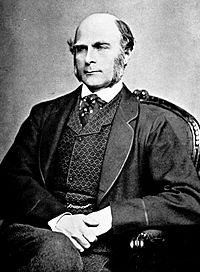Eugenics facts for kids
Eugenics is a big idea about how to improve the human species. It's a social and political way of thinking. It suggests guiding how people choose to have children. The main goal is to make humanity better over time.
This idea is based on some key beliefs. One is that genetics works for humans just like it does for animals. Traits are passed from parents to their children. This includes things like how smart someone is. For example, different dog breeds have different behaviors. All modern dog breeds are very different from wolves. Farmers choose which animals breed to get certain traits. Eugenics suggests a similar idea for people.
Negative eugenics tries to stop traits that cause suffering. It suggests limiting people with these traits from having children. Positive eugenics wants to create more healthy and smart humans. It encourages people with good traits to have more children.
In the past, many ways were suggested to do this. Even today, eugenics means different things to different people. The idea of eugenics is controversial. This is because it was used to be unfair to people. It led to discrimination against those thought to be genetically unhealthy or inferior.
Who Started Eugenics?

Modern eugenics was first thought of in 1865. Sir Francis Galton, a British scientist, created the idea. He was also the cousin of Charles Darwin. Galton believed that being smart and talented was passed down in families. He thought that people could be "bred" to be smarter. This would be like how animals are bred to be larger or smaller.
Galton thought the best way to do this was to learn more about heredity. He also wanted to tell people to marry others who were smart and strong. Galton chose the name "Eugenics." This name is similar to a Greek phrase meaning "well born."
Galton kept working on his eugenics ideas throughout his life. He understood both positive and negative eugenics. One big problem with eugenics came up quickly. It is very hard to agree on who is genetically "healthy" and who is "inferior." People have very different opinions on this.
Eugenics in Modern Times
Today, not many people openly support eugenics. However, many people wonder about new genetic technologies. They think about what these technologies might mean for the future.
One modern example is Genetic counselling. This is where parents can get information about their family's genes. They can even learn about the risk of a child having a hereditary illness. This helps parents make informed choices.
Related topics
Images for kids
-
G. K. Chesterton, an opponent of eugenics, in 1909, by photographer Ernest Herbert Mills
-
A Lebensborn birth house in Nazi Germany. This was meant to raise the birth rate of "Aryan" children.
-
Karl Pearson in 1912
See also
 In Spanish: Eugenesia para niños
In Spanish: Eugenesia para niños
 | Precious Adams |
 | Lauren Anderson |
 | Janet Collins |






